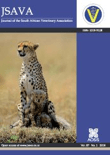
Journal of the South African Veterinary Association
Scope & Guideline
Unlocking Knowledge for Veterinary Professionals Worldwide
Introduction
Aims and Scopes
- Veterinary Medicine and Surgery:
Research on clinical practices, surgical techniques, and treatment protocols for various animal species, emphasizing innovative approaches and outcomes. - Animal Health and Disease Management:
Studies exploring infectious diseases, parasitology, and the epidemiology of diseases affecting both domestic and wild animals, contributing to better disease management strategies. - Wildlife and Conservation Medicine:
Research focused on the health and conservation of wildlife species, including immobilization techniques and the study of zoonotic diseases that impact both animals and humans. - Animal Welfare and Ethics:
Investigations into the welfare implications of veterinary practices, animal husbandry, and wildlife management, promoting ethical standards in animal care. - Nutrition and Physiology:
Studies examining the nutritional needs of various species and the physiological responses to different dietary regimens and environmental stressors. - Innovative Technologies in Veterinary Science:
Exploration of new technologies and methodologies, such as imaging techniques and telemedicine, to enhance veterinary diagnostics and treatment.
Trending and Emerging
- Zoonotic Disease Research:
An increasing emphasis on zoonotic diseases reflects growing public health concerns, with studies focusing on transmission pathways and control strategies. - Animal Welfare Innovations:
Research dedicated to improving animal welfare practices is gaining traction, with studies exploring new methods for assessing and enhancing the well-being of both domestic and wild animals. - Use of Advanced Technologies:
The incorporation of advanced technologies, such as UAVs for monitoring animal welfare and mobile ECG devices, highlights a trend towards innovative veterinary practices. - Sustainable Practices in Veterinary Medicine:
There is a rising interest in sustainability, with research exploring the environmental impacts of veterinary practices and the promotion of sustainable animal husbandry. - Immunology and Vaccination Studies:
Emerging themes around immunology, particularly regarding vaccination strategies for both domestic and wild animals, are increasingly relevant in the context of disease prevention.
Declining or Waning
- Traditional Livestock Diseases:
Research on diseases primarily affecting traditional livestock species has decreased, possibly due to a shift towards more pressing issues such as zoonotic diseases and wildlife health. - Basic Laboratory Studies:
Basic laboratory-based studies that do not translate directly into clinical applications or field practices appear to be less frequent, indicating a move towards more applied research. - Historical Epidemiological Studies:
Although historical epidemiological studies have contributed valuable insights, there seems to be a waning focus on retrospective analyses in favor of real-time data and current disease management strategies. - Veterinary Education and Training:
While important, studies focused solely on veterinary education and training outcomes have seen reduced prominence, as the journal increasingly prioritizes direct clinical and field research.
Similar Journals
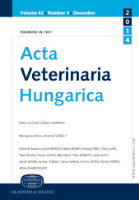
ACTA VETERINARIA HUNGARICA
Pioneering insights for the global veterinary community.ACTA VETERINARIA HUNGARICA is a prestigious academic journal published by AKADEMIAI KIADO ZRT, dedicated to the diverse field of veterinary science. With a history spanning over three decades since its inception in 1983, this journal provides a platform for the dissemination of high-quality research, clinical studies, and reviews that contribute to advancing knowledge in veterinary medicine and animal health. Based in Hungary, it has built a respectable reputation, reflected in its Scopus ranking, where it occupies the 84th position out of 194 in the General Veterinary category, placing it within the 56th percentile. Although the journal is not open access, it continues to attract a global audience of researchers, professionals, and students who are keen on exploring advancements in veterinary science as it converges towards its upcoming year of 2024. Readers will find valuable insights that foster innovation and improve animal care practices across various settings, making ACTA VETERINARIA HUNGARICA an essential resource for anyone involved in the veterinary field.
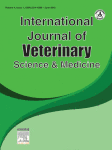
International Journal of Veterinary Science and Medicine
Elevating veterinary medicine with open-access insights.Welcome to the International Journal of Veterinary Science and Medicine, a leading platform for the dissemination of innovative research in the field of veterinary science. Published by TAYLOR & FRANCIS LTD, this esteemed journal has maintained an Open Access policy since 2013, ensuring widespread accessibility and engagement with cutting-edge veterinary studies. With an impressive impact factor and a Category Quartile ranking of Q1 in Veterinary (miscellaneous) as of 2023, it stands out as one of the top journals in its field, ranking #16 out of 194 in the Scopus Veterinary category, placing it in the 92nd percentile of academic publications. The journal encourages submissions of high-quality research and articles that contribute to advancements in veterinary medicine, ranging from clinical studies to public health implications. Located in the United Kingdom, the journal aims to foster collaboration and communication among veterinary professionals, researchers, and students, making it an indispensable resource for anyone involved in this vital field.

AUSTRAL JOURNAL OF VETERINARY SCIENCES
Exploring the Frontiers of Veterinary ScienceAUSTRAL JOURNAL OF VETERINARY SCIENCES is a prominent platform for innovative research in the field of veterinary science, published by UNIV AUSTRAL CHILE, FAC CIENCIAS VETERINARIAS. This journal, bearing the ISSN 0719-8000 and E-ISSN 0719-8132, serves as a vital resource for researchers, veterinarians, and students interested in advancing their knowledge in veterinary practices and animal health. With its influence reflected in its Q3 category ranking in the Veterinary (miscellaneous) field, and its Scopus rank of #95 out of 194, the journal highlights a robust commitment to disseminating valuable findings and insights. Between the years 2017 to 2024, it aims to provide open access to significant advancements and discussions in veterinary science, ensuring that vital research is accessible to a global audience. Located in Valdivia, Chile, the journal emphasizes its role in enhancing veterinary scholarship and fostering professional development within the community.
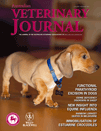
AUSTRALIAN VETERINARY JOURNAL
Fostering collaboration for impactful veterinary advancements.AUSTRALIAN VETERINARY JOURNAL, published by Wiley, is a leading journal dedicated to advancing the field of veterinary science. With a rich history dating back to 1925, this journal has become a vital resource for researchers, professionals, and students interested in veterinary medicine and its diverse applications. As evidenced by its impressive Scopus ranking, placing it in the 67th percentile among General Veterinary publications, and categorized within Q3 of the Medicine (miscellaneous) and Q2 of the Veterinary (miscellaneous) quartiles for 2023, AUSTRALIAN VETERINARY JOURNAL is recognized for its commitment to quality research and impactful contributions. Although not an open access journal, it continues to be an essential platform for disseminating vital findings and innovations within the veterinary community, fostering collaboration and advancement in animal health and welfare.

PESQUISA VETERINARIA BRASILEIRA
Bridging gaps in veterinary research and public health.PESQUISA VETERINARIA BRASILEIRA is a premier scholarly journal that serves as a vital platform for disseminating high-quality research in the field of veterinary sciences. Published by REVISTA PESQUISA VETERINARIA BRASILEIRA, this Open Access journal has been a beacon of knowledge since 1997, allowing global access to its valuable content and fostering collaboration among researchers, professionals, and students. With an ISSN of 0100-736X and an E-ISSN of 1678-5150, it stands out for its commitment to enhancing the understanding of veterinary practices, animal health, and public health implications in the context of Brazil and beyond. As of 2023, it holds a Q3 category in veterinary miscellaneous and ranks at the 43rd percentile according to Scopus, reflecting its growing influence and contribution to the veterinary community. Based in Seropédica, Rio de Janeiro, this journal publishes research covering a wide range of topics, aiming to facilitate knowledge exchange and drive innovation within the field. Join the conversation and contribute to the advancement of veterinary science through your submissions and readership.

CANADIAN JOURNAL OF VETERINARY RESEARCH-REVUE CANADIENNE DE RECHERCHE VETERINAIRE
Leading the Way in Veterinary Research ExcellenceCanadian Journal of Veterinary Research - Revue Canadienne de Recherche Vétérinaire is a leading publication in the veterinary science community, published by the Canadian Veterinary Medical Association. Established in 1986, the journal serves as a crucial resource for researchers and practitioners alike, covering a broad spectrum of topics pertinent to veterinary medicine and animal health. With a current impact factor placing it in Q2 in the Veterinary (miscellaneous) category, it holds a rank of #85 out of 194 in Scopus for general veterinary research, demonstrating its influence and importance within the field. While the journal is not open access, it remains committed to the dissemination of high-quality research that fosters advancements in veterinary practice and education. Based in Ottawa, Canada, it strives to connect the international community of veterinary researchers and professionals through rigorous peer-reviewed articles that advance knowledge and methodologies in veterinary science.

BERLINER UND MUNCHENER TIERARZTLICHE WOCHENSCHRIFT
Exploring Innovations in Veterinary MedicineBERLINER UND MUNCHENER TIERARZTLICHE WOCHENSCHRIFT is an esteemed journal in the fields of Veterinary Science and Medicine, published by SCHLUETERSCHE VERLAGSGESELLSCHAFT MBH & CO KG. Since its inception in 1946, this journal has served as a vital platform for advancing knowledge and research in veterinary medicine within Germany and beyond. With a current impact factor that places it in the Q4 category in both Medicine and Veterinary, it continues to provide significant insights for professionals, researchers, and students engaged in the veterinary community. Although it is not an Open Access journal, its rich content contributes to the foundational literature of the field, making it an essential reference. Researchers looking to publish their findings or keep informed on the latest advancements in veterinary and medical practices will find this journal an invaluable resource. It is headquartered in Hannover, Germany, and serves as a testament to the ongoing dedication to veterinary research since the mid-20th century.

Ankara Universitesi Veteriner Fakultesi Dergisi
Disseminating groundbreaking insights for animal welfare.Ankara Universitesi Veteriner Fakultesi Dergisi is a prominent academic journal published by ANKARA UNIV, focusing on advancements in veterinary sciences and animal biology. Since its inception, the journal has been committed to disseminating high-quality research, featuring articles that span a variety of topics within veterinary medicine and animal science. With an ISSN of 1300-0861 and an E-ISSN of 1308-2817, this journal provides valuable insights into the latest research developments and trends, making it a critical resource for researchers, professionals, and students in the field. The journal has established itself within the scholarly community, achieving a Q3 rank in Animal Science and Zoology and a Q2 rank in Veterinary (miscellaneous) as of 2023, reflecting its growing relevance and impact. Positioned in Turkey, it serves as a vital platform for both local and international scholars to share innovative findings and foster collaboration. Enhancing its accessibility, the journal's content is available through various academic databases, ensuring that its readership can effortlessly access and engage with cutting-edge research.

MAGYAR ALLATORVOSOK LAPJA
Bridging Tradition and Innovation in Veterinary ResearchMAGYAR ALLATORVOSOK LAPJA is a prominent journal dedicated to the field of veterinary science, published by MEZOGAZDA KIADO KFT in Hungary. With its inaugural issue dating back to 1950 and a continued presence into 2024, this journal serves as a vital platform for disseminating research and advancements in veterinary medicine and related areas. While the journal currently holds a Q4 classification in the Veterinary (miscellaneous) category, it provides a critical outlet for emerging findings and perspectives that may not be covered in more mainstream publications. Researchers, professionals, and students engaged in the veterinary field will benefit from its diverse range of articles, which are crucial for fostering knowledge and innovation in veterinary practice. Though it does not offer an open access option, the journal remains an essential resource for those looking to deepen their understanding of the veterinary landscape. The commitment to advancing the field is evident in every publication, making MAGYAR ALLATORVOSOK LAPJA a noteworthy contribution to veterinary literature.
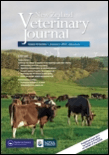
NEW ZEALAND VETERINARY JOURNAL
Exploring the forefront of animal welfare and medicine.NEW ZEALAND VETERINARY JOURNAL, published by Taylor & Francis Ltd, stands as a pivotal platform in the realm of veterinary science, contributing significantly to the global discourse on animal health and welfare since its inception in 1952. With an ISSN of 0048-0169 and an E-ISSN of 1176-0710, this journal offers invaluable insights within both the veterinary and general medical fields, currently achieving a commendable Q2 ranking in Veterinary (miscellaneous) and Q3 in Medicine (miscellaneous) for 2023. Its Scopus ranking places it in the 76th percentile among veterinary journals, affirming its high-impact presence in academia. While access to this journal is not open, it maintains an essential role for researchers, professionals, and students aiming to advance their knowledge and contribute to the field of veterinary science. With a commitment to disseminating quality research, NEW ZEALAND VETERINARY JOURNAL enriches the understanding of veterinary practices and enhances ongoing dialogue on critical health issues affecting animals, promoting better outcomes through scientific inquiry.